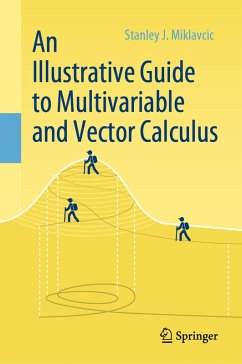This textbook focuses on one of the most valuable skills in multivariable and vector calculus: visualization. With over one hundred carefully drawn color images, students who have long struggled picturing, for example, level sets or vector fields will find these abstract concepts rendered with clarity and ingenuity. This illustrative approach to the material covered in standard multivariable and vector calculus textbooks will serve as a much-needed and highly useful companion.
Emphasizing portability, this book is an ideal complement to other references in the area. It begins by exploring preliminary ideas such as vector algebra, sets, and coordinate systems, before moving into the core areas of multivariable differentiation and integration, and vector calculus. Sections on the chain rule for second derivatives, implicit functions, PDEs, and the method of least squares offer additional depth; ample illustrations are woven throughout. Mastery Checks engage students inmaterial on the spot, while longer exercise sets at the end of each chapter reinforce techniques.
An Illustrative Guide to Multivariable and Vector Calculus will appeal to multivariable and vector calculus students and instructors around the world who seek an accessible, visual approach to this subject. Higher-level students, called upon to apply these concepts across science and engineering, will also find this a valuable and concise resource.
Dieser Download kann aus rechtlichen Gründen nur mit Rechnungsadresse in A, B, BG, CY, CZ, D, DK, EW, E, FIN, F, GR, HR, H, IRL, I, LT, L, LR, M, NL, PL, P, R, S, SLO, SK ausgeliefert werden.


